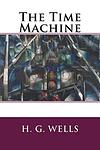H. G. Wells
H. G. Wells, or Herbert George Wells, was a prolific English writer born on September 21, 1866, and passed away on August 13, 1946. He was known for his work in the science fiction genre with famous novels like 'The War of the Worlds,' 'The Time Machine,' 'The Invisible Man,' and 'The Island of Doctor Moreau.' Wells is often referred to as the 'father of science fiction.' His work explored themes of social injustice and envisioned the future, including technological advancements and dystopian societies. In addition to his science fiction, he also wrote realistic novels, history, politics, social commentary, and textbooks.
Books
This list of books are ONLY the books that have been ranked on the lists that are aggregated on this site. This is not a comprehensive list of all books by this author.
-
1. The Time Machine
A Victorian-era scientist invents a machine that allows him to travel through time. He first journeys to the year 802,701 A.D., where he encounters the Eloi, a society of small, elegant, childlike adults who live in harmony but lack curiosity and drive. He later discovers the Morlocks, a nocturnal, subterranean species who prey on the Eloi. After rescuing an Eloi named Weena, the protagonist loses his time machine and must devise a plan to recover it and return to his own time, all while exploring the social and evolutionary implications of the two distinct societies.
-
2. War of the Worlds
This classic science fiction novel tells the story of a Martian invasion of Earth, as experienced by an unnamed protagonist and his brother. The Martians, who are technologically far superior to humans, cause widespread devastation with their heat-ray weapons and towering tripods. Despite humanity's best efforts to resist, they seem unstoppable. The novel is a commentary on British imperialism and explores themes of human survival and evolution.
-
3. The Island of Doctor Moreau
A shipwrecked man finds himself on an isolated island run by a mad scientist who has been conducting disturbing experiments, transforming animals into human-like beings through vivisection. The man must navigate this horrifying new reality while trying to maintain his own humanity and sanity, in a world where the line between beast and man is blurred. The narrative is a chilling exploration of the nature of humanity, the ethics of science, and the dangers of playing God.
-
4. The History of Mr. Polly
"The History of Mr. Polly" is a comedic novel that tells the story of Alfred Polly, a man dissatisfied with his life and marriage. After faking his death in a fire, he leaves his wife and shop behind to start a new life. He eventually finds peace and contentment working as an assistant to a man who runs a country inn. The book explores themes of self-discovery, the struggle against societal expectations, and the pursuit of happiness.
-
5. The Invisible Man
The book is a gripping science fiction tale about a scientist who discovers a way to make himself invisible. However, the inability to reverse the process leads him into madness and terror. The narrative explores themes of alienation, social responsibility, and the moral implications of scientific advancement. The invisible man's struggle with his condition and society's reaction to his invisibility serve as a critique of humanity's fear and misunderstanding of the unknown.
-
6. Tono Bungay
This novel is a satirical narrative that delves into the life of George Ponderevo, who is swept into the world of late Victorian commerce and invention through his uncle's creation of a questionable medicine, Tono-Bungay. The story, narrated by George himself, explores themes of ambition, social climbing, and the hollow nature of financial success. As George rises to wealth through the marketing of this essentially worthless tonic, the novel critiques the capitalist society that enables such dubious enterprises to flourish. Through its exploration of personal and societal moral dilemmas, the narrative presents a vivid depiction of the era's social stratifications and the illusions of grandeur that often accompany the pursuit of wealth.
-
7. The First Men In The Moon
"The First Men In The Moon" is a science fiction novel that follows two adventurers, a businessman and a scientist, who build a spaceship and travel to the moon. Once there, they encounter a strange civilization of insect-like creatures called Selenites and become embroiled in a dangerous and thrilling adventure as they try to survive and find a way back to Earth. The story explores themes of exploration, colonialism, and the limits of human knowledge, all within Wells' imaginative and thought-provoking narrative.
-
8. Best Science Fiction Stories of H. G. Wells
This book is a collection of the best science fiction stories by a renowned British author, known for his pioneering work in the genre. The anthology contains a variety of tales that explore themes such as time travel, alien invasion, evolution, and dystopian futures. The author's vivid imagination, combined with his scientific knowledge, results in stories that are both fantastical and eerily plausible, solidifying his status as a master of science fiction.







